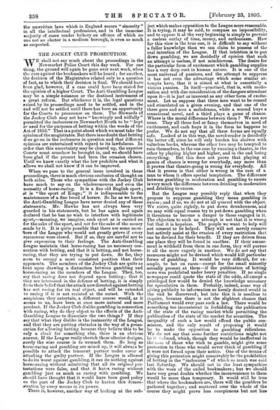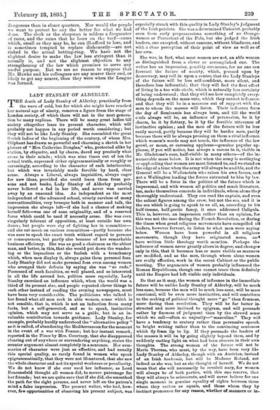THE JOCKEY CLUB PROSECUTION.
WE shall not say much about the proceedings in the Newmarket Police Court this day week. For one thing, the ground will again be gone over next week, when the case against the bookmakers will be heard ; for another, the decision of the Magistrates related only to a question of fact, as to which their decision is final. We should have been glad, however, if a case could have been stated for the opinion of a higher Court. The Anti-Gambling League may be a simple nuisance or the destined instrument of a great reform. But whichever it is, the legal questions raised by its proceedings need to be settled, and in the end will not be settled until there has been an opportunity for the Courts to pronounce on them. The Stewards of the Jockey Club may not have "knowingly and wilfully" permitted the inclosures on Newmarket Heath to be "kept or used for the purposes of betting within the words of the Act of 1853." That is a point about which we must take the opinion of the magistrates. But there is no doubt that betting does go on in the inclosures in question and that different opinions are entertained with regard to its lawfulness. In order that this uncertainty may be cleared up, the superior Courts must somehow be brought in, and we should have been glad if the present had been the occasion chosen. Until we know exactly what the law prohibits and what it allows we shall not know if it can be improved.
When we pass to the general issue involved in these proceedings, there is much obvious confusion of thought on both sides. Those who sympathise with the Jockey Club have much to say on the wholesomeness and even the necessity of horse-racing. It is a fine old English sport ; At is "the sport of Kings ; " it is indispensable to the maintenance of a fine breed of horses. So far as we know, the Anti-Gambling League have never denied any of these statements. Mr. Hawke has not always been very guarded in his statements, but he has again and again declared that he has no wish to interfere with legitimate sport,—meaning, we imagine, such sport as is carried on for the sake of the sport, and not for the sake of the money ,made by it. It is quite possible that there are some mem- %era of the League who would not greatly grieve if every racecourse were closed. But if so, they are careful not to give expression to their feelings. The Anti-Gambling League maintain that horse-racing has no necessary con- nection with betting, and that it is betting, and not horse- racing, that they are trying to put down. So far, they seem to occupy a more consistent position than their opponents. The members of the Jockey Club are quite as .bent upon drawing a distinction between gambling and horse-racing as the members of the League. They, too, say that racing does not depend upon betting ; that if they are interested in the defence of betting, it is simply from their belief that the attack now directed against betting has not racing for its real object, and will be extended to racing if it is not resisted at the outset. With the -suspicions they entertain, a, different course would, as it seems to us, have been at once more natural and more prudent. If the Jockey Club dislike gambling in connection with racing, why do they object to the efforts of the Anti- Gambling League to dissociate the two things ? If they say that what they dislike is the insincerity of the League, and that they are putting obstacles in the way of a prose.. cation for allowing betting because they believe this to be only a cloak for something else, there is an obvious answer. If the League really cherish these ulterior designs. -surely the wise course is to unmask them. So long as horse-racing and gambling are mixed up, it will always be possible to attack the innocent partner under cover of attacking the guilty partner. If the League is allowed to dolts worst against gambling, it can do nothing against horse-racing without admitting that all its original pro- testations were false, and that it hates racing without gambling just as much as racing with gambling. We should have thought that it would have been good policy on the part of the Jockey Club to hasten this demon- _stration by every means in its power. There is, however, another way of looking at the sub- ject which makes opposition to the League more reasonable. It is trying, it may be said, to compass an impossibility, and to oppose it at the very beginning is simply to prevent a useless outlay of time, money, and enthusiasm. How far this view is the true one, it is difficult to say without a fuller knowledge than we can claim to possess of the real intention of the League. If that intention is to put down gambling, we are decidedly of opinion that such an attempt is useless, if not mischievous. The desire for the particular form of excitement which gambling supplies has a very deep root in human nature. It is one of the most universal of passions, and the attempt to suppress it has not even the advantage which some similar at- tempts have, that it is aimed at what is essentially a vicious passion. In itself—practised, that is, with mode- ration and with due consideration of the dangers attendant upon it—it is just as innocent as any other form of excite- ment. Let us suppose that three men want to be roused and stimulated on a given evening, and that one of the three goes and sees a melodrama, while a, second buys a sensational novel, and a third plays a game of chance. Where is the moral difference between them ? We can see none. They all three feel or fancy themselves in need of excitement, and each buys it in the form he happens to prefer. We do not say that all three forms are equally safe. Looked at in this way, the novel-reader is decidedly the better off, since he will only burden his shelves with valueless books, whereas the other two may be tempted to ruin themselves, in the one case by running a theatre, in the other by playing higher and higher, and in the end losing everything. But this does not prove that playing at games of chance is wrong for everybody, any more than it proves that theatre-going is wrong for everybody. All that it proves is that either is wrong in the case of a man to whom it offers special temptation. The difference between gambling in moderation and gambling to excess is very much the difference between drinking in moderation and drinking to excess.
But the League may possibly reply that when they propose to suppress gambling they mean gambling in excess ; and if so, we do not at all quarrel with the object. We strive, quite rightly, to put down drunkenness, and we may with equal reason try to put down gambling when it threatens to become a danger to those engaged in it. The objection to such an attempt is not that it is wrong but that it is hopeless. The people we want to help will not consent to be helped. They will not merely connive but actively assist at the evasion of every restriction that can be devised for their benefit. If they are driven from one place they will be found in another. If their amuse- ment is withheld from them in one form, they will pursue it all the more eagerly in another. We do not say that measures might not be devised which would kill particular forms of gambling. It would be very difficult, for ex- ample, to bet on races—except for the small minority actually present at them—if the publication of betting news was prohibited under heavy penalties. If no single newspaper could quote the state of the odds, all except a privileged few would be denied the knowledge necessary for speculation in them. Probably, indeed, some way of giving publicity to information so keenly desired would in the end be discovered; but into this it is needless to inquire, because there is not the slightest chance that Parliament would ever pass such a law. There would be something too inconsistent in forbidding the publication of the state of the racing market while permitting the publication of the state of the market for securities. The inequality of such a law would offend the public con- science, and the only result of proposing it would be to make the opposition to gambling ridiculous. We do not say that some further restrictions might not be ir reduced, which, though they would be ineffectual in the ed.se of those who wish to gamble, might give some protection to those who would never think of gambling if it were not forced upon their notice. One of the means of giving this protection might conceivably be the prohibition of betting in the " inclosures " of which so much was said last Saturday. We should not in the least sympathise with the woes of the exiled bookmakers ; but we should have very great doubts whether the inconvenience to them would be more than temporary. It would still be true that where the bookmakers are, there will the gamblers be gathered together; • and scattered over the whole of the course they might prove less conspicuous but not less dangerous than in closer quarters. Nor would the people we want to protect be any the better for what we had done. The clerk or the shopman is seldom a frequenter of races, and the sums that he loses on the turf—sums which, small as they may be, he can ill-afford to lose, and is sometimes tempted to replace dishonestly—are not risked in the actual betting-ring. We have not the slightest desire to make the law less stringent than it actually is, and not the slightest objection to any strengthening of the law which promises to aerve any useful purpose. But we see no reason to suppose that Mr. Hawke and his colleagues are any nearer their end, or likely to get any nearer, than they were when the League was formed.



































 Previous page
Previous page